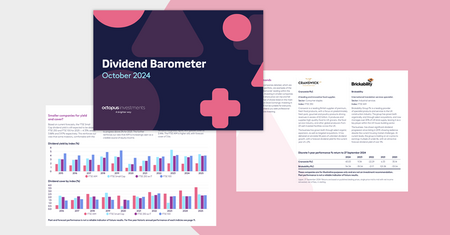GuideBusiness Relief
Having a process for when a client dies
When a client passes away, that’s when estate planning needs to work as intended. This guide should help you make sure it does, for every client.
The value of having a process in place
Putting a process in place
For estate planning to run smoothly, it helps to have a process in place for when a client dies.
In this guide you’ll find practical ideas to help you develop such a process.
Octopus has been managing investments that qualify for Business Property Relief (BPR) since 2005 and is the largest provider of BPR-qualifying investments.1
Our dedicated Intergenerational Planning team has helped nearly 8,000 estates through the probate process and more than 2,000 advisers retain beneficiaries as clients of their own.
What to do ahead of time
What to do ahead of time
Many of the financial advisers we work with are well prepared for when they get the call to say a client has passed away.
This helps them provide valuable advice efficiently to the executors during the probate process. It also puts advisers in a strong position to take on beneficiaries as new clients as well.
One of the best tips we can pass on is to focus on three things when drawing up a process for when a client dies:
- Organisation
- Transparency
- Communication
Let’s look at each in turn.
1. Organisation
Executors are responsible for finding out the value of an estate and distributing it to the beneficiaries. This can be very difficult without the right records and information. You can help ahead of time by encouraging your older clients to prepare a pack for their executors.
This will mean executors have access to a lot of useful information in one place. Here are some examples of the sort of thing this could include:
- The latest version of the will.
- Key contacts list, including solicitor and financial adviser (you).
- Annual tax returns.
- Deeds, mortgages and bills of sale.
- Legal documents (e.g. birth certificates, marriage licence, divorce papers, passports).
- Home improvement documentation and receipts.
- Receipts for major purchases, for warranty and insurance purposes.
- Power of attorney designation.
- Medical and burial instructions.
- Beneficiary directions.
- Certificates of ownership.
- Current insurance policies.
- Medical records.
- Pension plan records.
- Retirement plan records.
There should also be a clear instruction to call you as the financial adviser. You will be uniquely placed to provide valuable advice to the executors about the investments your client has made.
2. Transparency
Our experience shows that in many cases executors don’t know they will be named as executors until after the client has died and the will is read.
At that point their first port of call tends to be a solicitor. Executors won’t always think to call the deceased’s financial adviser as well.
It’s understandable that people are reluctant to talk about their own death. It’s also fair that they may prefer to keep their planning private.
However, clients may not have given much thought to the value of being transparent with their executors.
As a financial adviser, you are in a good position to encourage clients to have those conversations, which will make it much easier for their executors when the time comes.
3. Communication
When helping a client to plan for their estate, encourage them to bring their executors or beneficiaries along to a meeting with you.
This will give you an opportunity to:
- Build a relationship with them in a much warmer way than approaching them after your client has passed away.
- Explain the planning you have put in place.
- Demonstrate your expertise and the value of financial advice.
- Explain how you can help when their loved one does pass away.
Steps to take when a client passes away
Steps to take when a client passes away
When a client passes away, it is vital to make sure that the planning you did for them has its intended effect.
Remember, any adviser charging you had in place will stop when your client dies. But you are in a position to provide valuable advice to the executors. Taking the following six steps should help the process run more smoothly.
- Arrange to meet the executors. Reassure them you’re there to support them and let them know how you can help.
- Start requesting date of death valuations from investment providers. This is a great way to take some of the load off executors.
- Speak to the solicitor so they know you’re involved. Solicitors won’t always think to involve the financial adviser, so this is a really important call to make.
- Talk to investment providers about their processes and support. Your client will have investments with a range of different providers. Each one will have its own process for when a client dies. It’s good to familiarise yourself with these, as well as any practical support the provider can give you during the process.
- Highlight any tax benefits of the estate planning your client had in place. This includes BPR-qualifying investments, to make sure all available inheritance tax relief is claimed. There may also be tax benefits for the beneficiaries who inherit the investment.
- Arrange to meet beneficiaries. To help them understand their new financial situation, their options and potentially provide them with any advice they may need as clients of your own.
If you provide advice to executors and want to arrange to be paid for this from the investments that we manage, please call our Intergenerational Planning team on 0800 294 6826 and ask for our Executor Charging form.
An overview of the probate process
An overview of the probate process
Before the executors can distribute your client’s estate to the beneficiaries, they will usually need to apply for probate.
The following gives you a high-level overview of the steps in the probate process:
- The registrar issues the death certificate.
- Executors start collating the date of death value of the estate and other relevant information such as lifetime gifts that might have been made.
- The executor applies for probate. Executors will need to submit a probate form along with the relevant tax return forms. Executors will usually need a solicitor or an estate administration service to help assist them when applying and dealing with probate.
- Executors arrange payment of the inheritance tax bill.
- Probate is granted if the estate is found to be in order.
- The executor can settle any outstanding debts the estate may have and sell any assets where relevant.
- Executors can now distribute the estate to beneficiaries.
Be aware this process can often take several months. When a client dies, their investments will pass to new owners according to their will after probate has been granted. Those beneficiaries can often benefit from financial advice so they can better understand their options. This is particularly true if an inherited investment qualified for BR.
There may be tax benefits for beneficiaries in addition to those that can be claimed for the deceased’s estate. Please give our Intergenerational Planning team a call and they’ll provide you with information you need to support your client’s beneficiaries.
Your next steps
Your next steps
There are a lot of actions you can take, starting now, that will put you in a stronger position when a client passes away.
Something we’ve found to be very popular among advisers is our ‘What I Own and Where I Keep It’ document. You can take this to a client meeting and fill it in together, recording the details of the assets they hold and what executors will need to do to access them.
Not only will this make things easier for executors, it also acts as an opener for suggesting you meet with beneficiaries to discuss the client’s estate planning.
We can provide this document for you in both hardcopy format and as an interactive PDF that can be updated and stored digitally.
To request a copy, call our Intergenerational Planning Team on 0800 294 6826.
1 Tax Efficient Review, 2024.
Other useful documents
Related inheritance tax resources

The Knowledge Base
Need some support with the technical details of estate planning?
Look no further than The Knowledge Base.

Ask Octopus
Have a technical question about estate planning, or a question about the tax rules relating to a client’s estate?
We’re here to offer advisers support.

Estate planning now and moving forward
Visit our inheritance tax post-Budget webpage.




